Estimated Read Time: 33 Minutes
Table of Contents
Gain Insight, Reduce Effort, Measure Results
Search engine optimization (SEO) is complex, ever-changing, and highly competitive. To do it right, you need access to a variety of tools to help you gain insight, reduce the amount of time spent on elaborate and repetitive tasks, and quickly and easily determine whether progress is being made.
The good news is there are thousands of SEO tools on the market. The bad news is they tend to be poorly differentiated, highly specialized (meaning you need a lot of them), and expensive. Google offers a small number of free and helpful SEO tools but the vast majority of industry tools are subscription-based. The cost can add up quickly, especially if you’re a budget-conscious small business owner.
In this post, I will share a couple of dozen tools I have experimented with and/or subscribed to over the years as a small business SEO. I will describe their purpose, pricing (in 2021 dollars), and the ones I tend to work with the most. The goal is to help you decide what tools, if any, are worthy of your investment.
Feel free to ping me at the end of the post if you have questions.
What Can You Do With Small Business SEO Tools?
It helps to begin by categorizing the different things you can do with SEO tools so you don’t waste time reviewing ones you possibly don’t want or need.
I have listed 11 SEO activities below, along with a brief description of what is mean by each. It is not a comprehensive list, just the tasks I tend to use a core set of tools for almost every day.
| Activity | Description |
|---|---|
| Citation Research | Quantify and qualify sources of online mentions |
| Competitive Research | Identify online competitors, their strengths and weaknesses |
| Content Audit | Inventory and assess the health of existing website content |
| Content Ideation | Inspire content ideas |
| Keyword Research | Identify the best-fit words and phrases people use to search for your goods and services |
| Link Research | Quantify and qualify links pointing to a website and/or page |
| On-Page Optimization | Apply on-page (content) optimization best practices |
| Rank Tracking | Determine where existing content is ranking in search results |
| Reporting | Aggregate, summarize, and share views of website and content performance over time |
| Speed Optimization | Compress images to speed content rendering (a ranking factor) |
| Technical Audits | Assess the health of your, and your competitors’, website structure, design, and build |
I get a lot of questions about website development and hosting tools. While these aren’t strictly part of SEO, they certainly influence your ability to optimize a website so I’ll talk about them briefly at the end.
Citation Research
Citation research tools help you identify online mentions of your business by name and address, name and phone number, or website. Online mentions help Internet users discover and find you. They help your rankings because search engines have greater confidence ranking you when they can validate you are, in fact, a legitimate business.

Citations are online mentions of your business by name and address, name and phone number, or website.
Tools and Pricing
I use two different tools for citation research – Whitespark and Bright Local. Both are relatively inexpensive and help you determine the number and source of citations for a business. This helps you decide if it’s worth the effort and expense to update existing citations or to acquire new ones.
- Whitespark gives you free limited access to their citation research tool. A small business subscription costs $39 / month.
- Bright Local lets you do a free local listing (citation) scan for 15 popular directories. A monthly subscription for a single business and user costs $29 / month.
- You can also do a free citation scan for 15 popular directories on Moz after creating a free account.
After citation research, the next step is to begin citation cleanup and acquisition. For that, I tend to use a service versus a tool. Bright Local, Moz, Whitepark, and others offer citation cleanup and acquisition services.
Competitive Research
Ranking at the top of search results and then convincing visitors to become loyal customers isn’t easy. One of the best places to start is by reviewing competitor websites to learn what they are doing right and where there might be opportunities for you to advance. That process typically starts by searching online to see who rises to the top when you type in the most popular terms and phrases used to describe your goods and/or services.

Once you have a shortlist of competitors, you can use a variety of tools to learn more about the health of their existing website, their published content, and who links to or mentions them on the Internet.
Tools and Pricing
I generally start with a multi-purpose SEO tool.
- Ahrefs is my preferred tool for doing much of this research. Ahrefs is one of the more popular all-in-one SEO tools. It can be used for competitive research, keyword research, link research, rank tracking, and content and technical audits. They have an excellent blog, how-to guides, and weekly tutorials. An annual subscription to Ahrefs costs $990.
- Moz and SEMRush also offer useful all-in-one SEO tools. Entry-level subscriptions to these tools cost $950 and $1,200 / year respectively. You might want to do a trial run of all three before deciding on a toolset. Everyone’s needs and preferences are different.
- All these tools offer browser extensions which are super helpful when doing competitive research. The extensions are free but show only a limited amount of data unless you are a tool subscriber.
When doing competitive research for local businesses, I will also use Whitespark and Bright Local to compare citation health.
Content Audits
A content audit inventories and assesses the health of existing website content so you can decide what to keep, update, or delete. A lot of poor-performing content on a website can lower its quality assessment and rankings.

Google has said it considers more than 200 different factors when deciding who ranks where in search results. While they don’t publish a list of those factors and SEOs don’t all agree on what is and isn’t important, there is general consensus that search behavior or “user experience” influences Google’s ranking decisions. Your goal should therefore be to produce useful content – content that is sought-after, unique, engaging, and valuable, meaning it should help people do what they want and need to do.
Tools and Pricing
I use a variety of different SEO tools to help me assess the health of existing website content.
- First, I use a website crawler called Screaming Frog to inventory existing content and to extract key on-page data like the title of pages and posts, the number of words and images on the page, and the description displayed in search results.
- I use Google Analytics to gauge user experience – how many times a page is visited and viewed, how much time visitors spend on the page and website, and whether they return to search results before engaging further.
- I use ahrefs, SEMRush, or Moz to inventory the number of incoming valuable links to content.
- I look at Google Search Console to identify content click-thru rates and backlinks.
I use all this data to make informed decisions about whether search engines and visitors find value in your content so I can recommend keeping, updating, or deleting it.
Screaming Frog offers a free limited version of their tool which may be sufficient for many small business owners. The paid version of the tool costs £149 / year. Google Analytics and Google Search Console are free. The pricing for ahrefs, SEMRush, and Moz, as previously mentioned, are $990, $950, and $1200 a year respectively.
Content Ideation
One of the most challenging aspects of SEO is coming up with new content ideas. There is a flood of new content published on the Internet every single day. Many small business owners struggle with what to write about because they feel as though everything has been written already.

There are two reasons why I don’t believe that to be true.
- First, you should write from the perspective of your unique audience. No one knows your best prospects and customers better than you. You know their pain points, their wants and needs, and what you have to offer that can specifically help them.
- Second, not all content on the Internet is helpful. In fact, a lot of it just gets in the way of people being able to find what they are looking for quickly.
As a website owner, your goal should be to produce and publish only high-quality content – satisfying and rich content that is uniquely valuable and engaging for your audience. You can do that by researching what has already been published and then writing something that is infinitely better.
Tools and Pricing
I use a mix of tools to come up with new content ideas.
- I use ahrefs, Moz, and/or SEMRush to identify the most popular content of top competitors. I review that content for its freshness, accuracy, completeness, and ease of comprehension so I can decide if it can be improved upon.
- I use keyword tools (below) to identify what audiences are searching for.
- I run queries on Buzzsumo to identify the type of content that is performing well on social media, and Google Trends to identify what is currently popular.
- Answer The Public and the Google People Also Ask feature in search results are good tools to identify burning questions your audience might have, as is just asking your front-line sales and support staff.
Buzzsumo has a limited free use plan and then runs for $948 / year. Google Trends, Answer the Public, and People Also Ask are all free.
Keyword Research
Keyword research helps you discover the words and phrases people use to search for your goods and services. It helps you narrow that list down to the few that are the most popular, the best fit for your business, and the ones you have the greatest likelihood of being able to rank for.
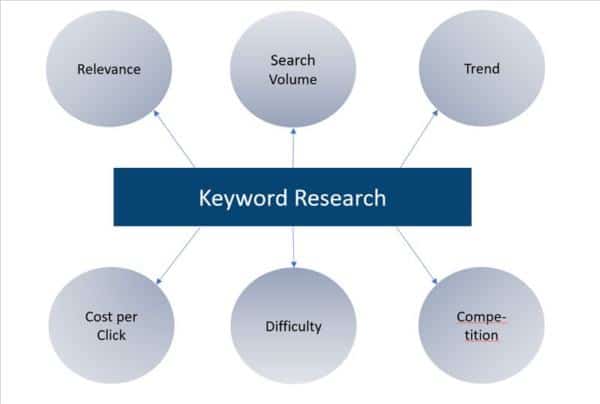
Tools and Pricing
Keyword tools have been around since the inception of SEO 20-odd years ago. For that reason alone, there are lots of them. I’ll talk about the more commonly used ones below.
- The multi-purpose SEO tools (ahrefs, Moz, and SEMRush) all have built-in keyword research tools. All are helpful. When you’re doing keyword research, you want a large set of keyword options to choose from so I tend to use a mix of these tools and a few others.
- Google Search Console is particularly helpful when it comes to finding opportunities to increase your rankings for specific keywords because the tool gives you the words and phrases you already rank for and where you rank. So, for example, if there is a highly worthwhile keyword phrase that you rank at the top of page two for, you might want to put the effort into acquiring more links to try to bump that page up to page 1.
- Google also has a tool called Keyword Planner that many people like to use for keyword research but you have to remember it is really intended for paid advertisers. The tool gives you a sampling of keyword phrases and provides you with only a search volume range estimate, for example somewhere between 100 and 1,000 searches a month versus an exact number. Keyword Planner is free to use.
- Soovle gives you suggested keyword ideas that are “scraped” from Google, YouTube, Bing, Yahoo, Amazon, and more. It’s good for quick research but doesn’t give you a whole lot of data to work with. I find it a bit cumbersome to work with but it is free to use.
- Jaaxy is a decent tool for the price and has a neat data point where the tool estimates the number of visits you’ll get a month from a keyword phrase. Jaaxy has a free limited-use plan and then costs $49 / month.
- Keywords Everywhere is a popular paid keyword tool that integrates with your browser and Soovle. The “People Also Search For” data point is helpful to have when you’re outlining your content for the page. This tool is also helpful in that you can pay as you go. You purchase credits up-front and replenish as needed.
- Keywordtool.io is similar to Soovle but, in my opinion, easier to use. You get lots of keyword suggestions and have the ability to easily filter the list down to only the most viable for your business. There is a free and paid version of keywordtool.io. The paid version starts at $69 / month.
- Lastly, Ubersuggest is a newer all-in-one SEO tool created by the team at Neil Patel. It has a decent keyword research tool and a really easy-to-use interface. I find the results very similar to Soovle, Google Keyword Planner, and Keywordtool.io, no surprise given these are all scraper tools. Ubersuggest has a free 7-day trial and then costs $29 – 99 / month. Most small businesses should be able to manage fine with the lower-cost plan.
Like many of these tools, your preference will depend on your objectives, needs, and budget. I tend to use ahrefs, Moz, keywordtool,io, and Google Search Console the most.
Link Research
One highly influential and reliable ranking factor has to do with the quantity and quality of incoming links to a page or post. Link research tools help you quantify incoming links and identify their sources so as to be able to determine their quality (relevance, authoritativeness, and trustworthiness).
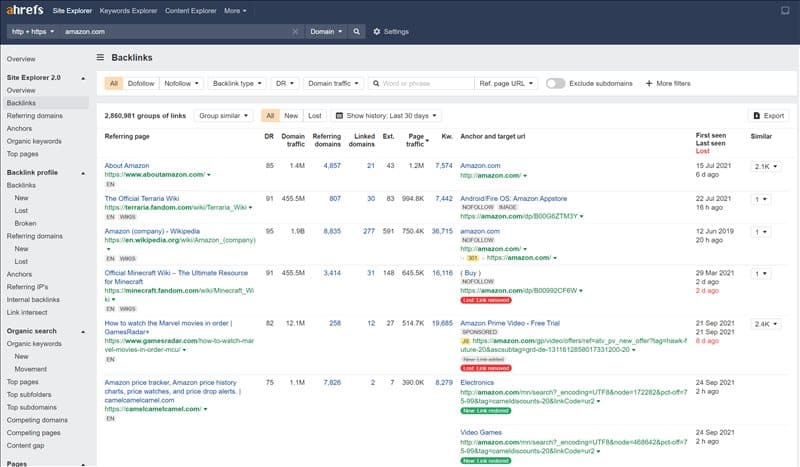
Sample ahrefs backlink report for amazon.com
Every link research tool produces different results because they all use different methods and tools to gather the raw data. Don’t treat the data as fact. Instead, look for trends, especially when comparing one link profile to another.
Tools and Pricing
I use four SEO tools to help me optimize content for visitors and search engines.
- I use the all-in-one (ahrefs, Moz, SEMRush) tools to check backlink profiles.
- I use Google Search Console to quickly identify a sampling of incoming links to a website.
- I also like to use the Moz toolbar (a browser extension) for quick link research. It will tell me the number of incoming links to a domain, page and/or post, the number of unique sources of those links, and whether the links are spammy. The “SPAM” score gives me a high-level assessment of the overall quality of the website’s backlink profile. Ahrefs and SEMRush have similar browser extensions.
The Moz browser extension is free but shows only a limited subset of data unless you are a tool subscriber. Same for ahrefs and SEMRush.
- Because the Moz toolbar is limited without a paid subscription, another option is to try the SEOQuake browser extension. It provides a lot of useful information and many SEOs use it.
On-Page Optimization
On-page optimization involves applying best practices to the use of keywords in content, metadata, internal links, and URLs.
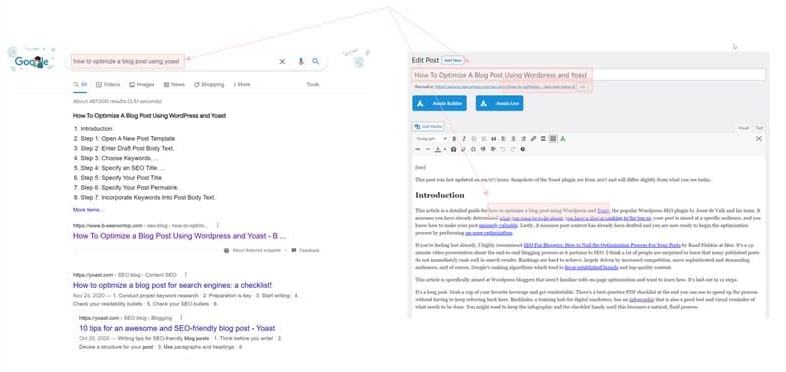
Search results (left) and keywords being used in content (right)
Google sorts through hundreds of billions of web pages to find and display the most relevant and useful content in a fraction of a second. Ultimately your goal should be to produce relevant and useful content – content that is sought-after, unique, engaging, and valuable. You should demonstrate your expertise along the way so people are convinced to want to do business with you now, or at some point in the future.
Tools and Pricing
I use three types of SEO tools to help me optimize content for visitors and search engines.
- First, I use a WordPress plugin called Yoast. Yoast provides an easy-to-use interface for customizing content metadata and suggests where to use keywords so you can comply with best practices.
- The second tool I use is a Chrome extension called Grammarly. Grammarly highlights spelling and grammar mistakes so you have an opportunity to fix them before content is published. Good grammar doesn’t make you rank higher in search results but it definitely helps visitors understand what you are trying to communicate to them.
- Lastly, I use a plugin called WP SEO Structured Data Schema Pro to add schema to web pages and posts and the Schema Validator tool to confirm schema has been set up correctly.
The Yoast will also add schema to your content. For now, I prefer the Schema Pro plugin because it has more schema options and it is transparent about what is being produced.
Structured data uses a standardized search engine “vocabulary” to communicate the content of your page to search engines. Using schema increases the likelihood Google will show additional eye-catching information about your content directly in search results page, things like site links, star ratings, event dates, and prices.

Example schema shown in search results – site links (left) and ratings (right)
Yoast offers free and paid versions of their tool. The paid version costs $89 / year and makes suggestions for internal linking which helps content rank higher in search results. Grammarly is free for registered users.
WP SEO Structured Data Schema Pro costs $49 / year. The Schema Validator tool is free to use.
Rank Tracking
Rank tracking tools help you figure out where your content is currently ranking in organic or local search results for a specific keyword and location. This allows you to determine whether you’re making progress with your SEO efforts or you need to switch gears and try something new and different.
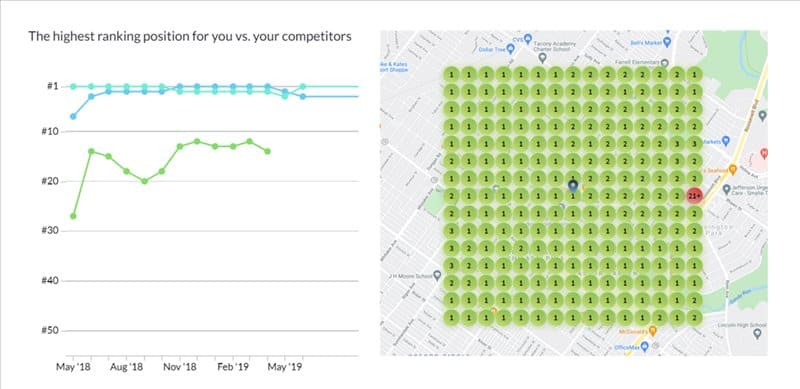
Example Organic (left) and Bright Local’s (right) Keyword Rankings Grid
Keyword rankings change hourly because Google updates its ranking algorithm 8-9 times a day. Results depend on when you search, from what device, whether you’re logged into your Google account or not, and where you’re searching from. For these reasons and others, it is always best to check rankings over time and to base your decisions on trends over time.
Tools and Pricing
Again, I use a mix of tools for rank tracking.
- On a day-to-day basis and for one-off keyword phrase and location checking, I use a Chrome or Firefox browser extension called GS Location Changer from Valentin Pletzer. The tool will show you what the search results look like for a specific location, time of day, device, and keyword phrase. There is an app version of the tool (valentin.app) as well and there is no charge for the use of the extension or app.
- Bright Local has an easy-to-use (and free) tool that allows you to do the same thing. You can find it here.
- As for bulk keyword rank checking, I use one of the all-in-one tools – ahrefs, Moz, or SEMRush.
If none of the aboves appeal to you, you have other options just make sure you can check mobile as well as desktop results and from multiple locations. Advanced Web Ranking looks to be a good and affordable tool ($49/year) but I have not tried it myself so can’t recommend it.
The image on the right above is from a special category of local SEO tools that lets you do rank tracking for individual local searches across a given geographical area (a ‘geo grid’). There are a number of local SEO tool providers that offer a version of geo grid ranking, including Bright Local, Local Falcon, Local Viking, Places Scout, and the all-in-one SEO tool, SEMRush. These tools are particularly helpful if you are competing for business in a highly competitive market in a small, or densely competitive geography. A good example of when you might want to use something like this is would be if you were a law office situated in a cluster of densely packed law officers around a local courthouse.
Reporting
Reporting refers to the process of aggregating, summarizing, and sharing perspectives on website and content performance over time.
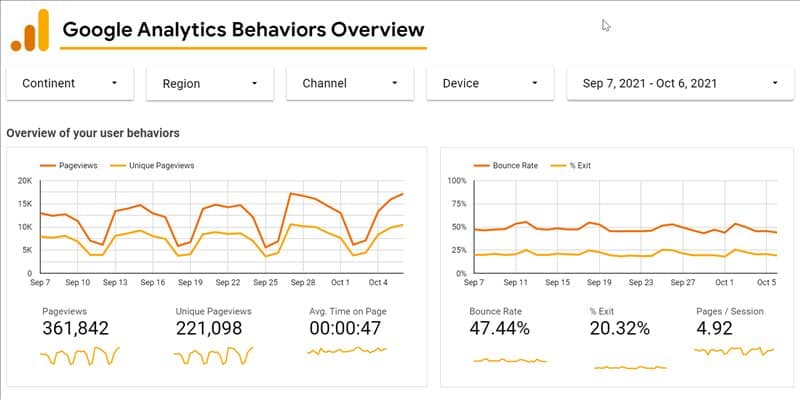
Sample Google Data Studio Report
Unless you are a small business that is sharing reports with clients, it is unlikely you’ll need to create any kind of formal performance reports. If you do have a need, there are tools that specialize in bringing in data from most of the tools we’ve been talking about as well as Google Analytics to let you see trends in performance over time.
Tools and Pricing
I personally have found many of the specialized reporting tools to be inadequate for the job. The real value, in my mind, comes from assembling the data manually as patterns and opportunities arise along the way.
- For that, I use tend to use good-old Microsoft Word and/or Google Data Studio. If you have any volume of reporting to do, my recommendation would be to create a template using Google Data Studio and pull in the specific account data you need to be able to complete your analysis and reporting.
- Google Analytics is great for day-to-day and trend monitoring. It just doesn’t lend itself easily to client reporting.
- The local SEO tools (Bright Local and Whitespark) are also capable of producing attractive one-off reports that can be integrated into your custom reporting.
Google Analytics and Google Data Studio are free. Microsoft Word costs $60 / year.
Speed Optimization
Speed optimization helps ensure your web content loads in less than 2.5 seconds or less on mobile devices and 3G networks. The Google Search Team announced speed would become a ranking signal for desktop devices in 2010. A decade later, most people had shifted to accessing the Internet via a mobile device and Google updated its algorithm to include page speed as a ranking signal for mobile as well as desktop devices.
It’s not just Google that cares about page speed. The amount of time it takes for a page to render on a browser directly affects your business results. Not everyone has an up-to-date, high-speed phone on a high-speed network. A Google benchmark study found people are 32% more likely to abandon your website (bounce) if a page or post takes more than 3 seconds to load. Bounce rates increases to as much 123% when page load time is greater than 10 seconds.
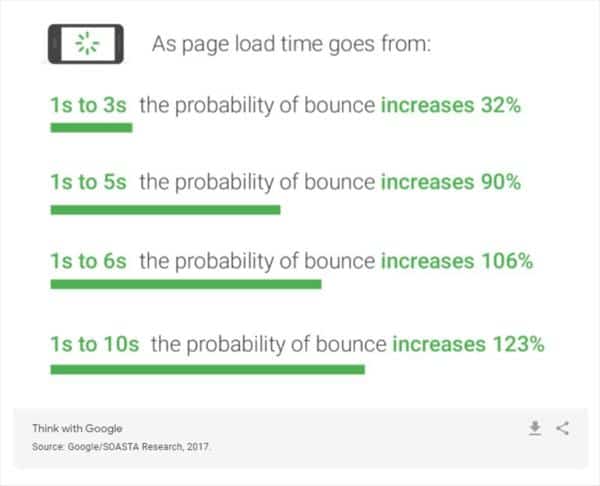
Tools and Pricing
There are many factors that impact how quickly your page loads. The tools discussed below deal with caching and image optimization for WordPress websites. WordPress powers 30% of websites and a large percentage of those are owned by small businesses.
- For caching and image optimization, I use a WordPress plugin called WP Rocket (affiliate link) or Nitropack. Both store a static version of your page content in memory to avoid time-consuming database queries that can slow page rendering and have image compression features that store images in their ideal resolution without having to compromise quality.
- I also like to use TinyPNG to compress images. It does a good job and is free to use for up to 20 images a day that are less than 5MB in size.
- WP Rocket costs $49 for a single site for a year. Nitropack is free for very low volume websites (5,000 page views/month) or $210 / year for 50,000 page views a month).
- To test page speed I use a mix of tools – GTMetrix, Google Page Speed Insights, Google Search Console, and WebPageTest. All have free versions you can use. GTMetrix is a great all-around speed testing tool but you may need to invest in the paid version of the tool to test for mobile speed, which is what we (and Google) cares about.
- Google tools give you Google’s perspective on your page loading times. WebPageTest is great for diagnostics if your page turns out to be too slow. Google Page Speed Insights and WebPageTest are free.
Technical Audits
Technical SEO audits help you determine whether an existing website has been structured, designed, and built using SEO best practices.
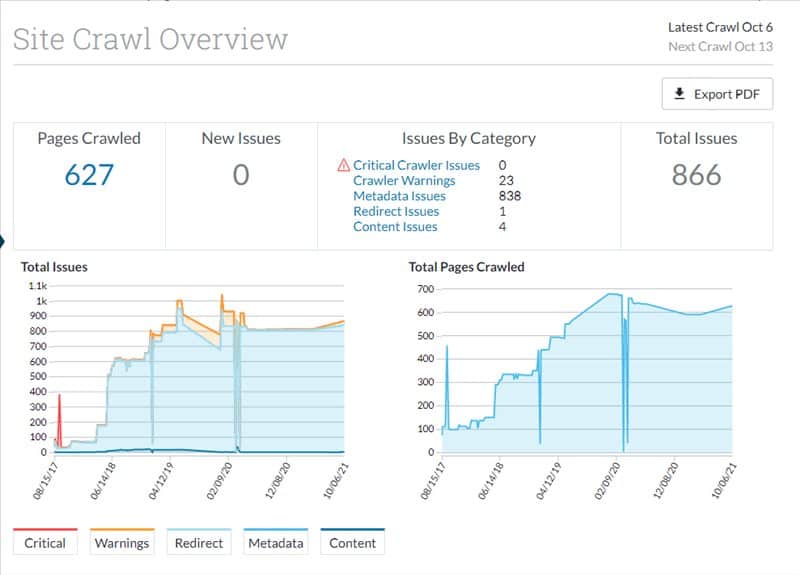
Example Technical Audit Report from Moz
Audit fails can result in your website not getting found or indexed by Google which, in turn, leads to your not showing up in search results.
Tools and Pricing
Not every audit issue needs to be perfectly resolved, but certainly, they need to be looked into and a conscious decision made as to whether to fix, dismiss, or ignore for now.
- Once again, the multi-purpose SEO tools (ahrefs, Moz, and SEMRush) offer technical audits. They are good for giving you a high-level overview of the health of the existing website. There’s a lot they won’t catch as well. I tend to use a mix of tools and a deep dive into critical, unclear, and important areas to come up with a detailed list of problems, missed opportunities, and recommended next steps.
- I also use the previously mentioned Screaming Frog crawler to perform a more in-depth health assessment. I find it extremely valuable.
Website Development
Website development often begins by deciding on your website development toolset, hosting, and site structure. While not strictly an SEO tool, your choice of website development tool is important because it has a tremendous impact on your ability to optimize your website relatively quickly, easily, and affordably.
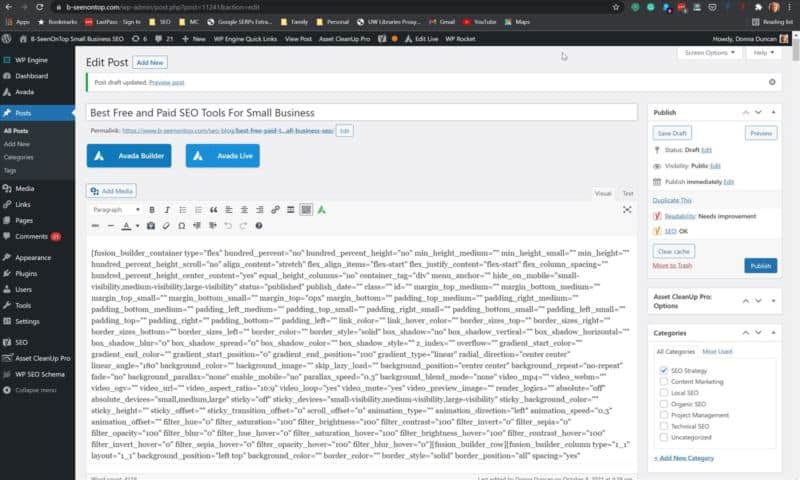
View of the back-end of a WordPress website
Remember I’m talking about small business websites – sites that do not receive millions of visitors every hour of the day. These website owners do not want to have to reinvent the wheel when it comes to building their websites. They just want to ensure their website will be accessible and affordable and that it can be customized with content that accurately and professionally represents them in the marketplace.
Tools and Pricing
When it comes to small business websites, we’re primarily concerned with which content management system (CMS) to use. A CMS makes it easy for laypeople to add, update and delete content. Popular CMS names you might recognize include Big Commerce, Hubspot, Magento, Shopify, Squarespace, Wix, Woocommerce, WordPress.com, and WordPress.org.
I typically, but not always, recommend WordPress.org. Exceptions include those who want to run a short-term market test, experiment with building a website on their own, or those who want to create a simple brochure site they can point people to and not worry about being found by search engines. For almost everyone else, I recommend WordPress.org. The difference between the .org and .com tools is WordPress.org is a collection of software that can be used to build and maintain a website whereas WordPress.com is a service that helps you build a website using the WordPress.org toolset.
Confusing, I know. WordPress.org gives you far more autonomy, options, and control.
The reasons I recommend WordPress.org include:
- WordPress is the most popular content management system for small business owners. That means there are lots of designers, builders, and tools that work with the toolset translating into greater choice and affordability. If you have a need or a problem you want addressed, there is a WordPress designer or developer who will be able to help you.
- There are tens of thousands of WordPress plugins available on the market. That means if there’s a feature or function you want added to your website, there’s a good chance someone has created it already. Find it, plug it in, test it, and you’re good to go. No reinventing the wheel.
- One of those infamous plugins is the Yoast SEO plugin I talked about earlier. Yoast makes it relatively easy to comply with industry-standard SEO best practices.
You pay for WordPress by purchasing a website theme or template and hosting it on an external server with universal access. Themes typically cost less than $100 / year for licensing and support. Hosting runs $15 / month and up. Generally, the more you pay, the greater the stability, speed, and support you’re going to end up with.
Conclusion
Generally, you can’t go wrong with a multi-purpose tool like Ahrefs, Moz, and/or SEMRush for organic SEO. (Databox recently published a detailed comparison of Ahrefs and SEMRush which is very helpful.) You’ll also need one or both of Bright Local and Whitespark for local seo and a crawler like Screaming Frog for website audits. In terms of content creation and publication, I simply can’t live without WordPress and Yoast SEO. While rank checking tools are great, depending on the number of keyword phrases you’re tracking, you might be able to get by with the GS Location Change browser extension and call it a day. Lastly, I do find the Moz toolbar extremely helpful in my day-to-day travels. I can see a numeric representation (domain authority) of the value Moz thinks Google associates with different websites and get a quick feel for how many other websites are linking to them. There are other quick assessment tools that show similar metrics though, including a free one called SEO Quake which also seems to be popular with many SEOs.
So that’s it! If you have a question or want to common on something you’ve read here, please feel free to say so below. I typically respond within a few business days.
Thanks for staying to the end!







Leave A Comment